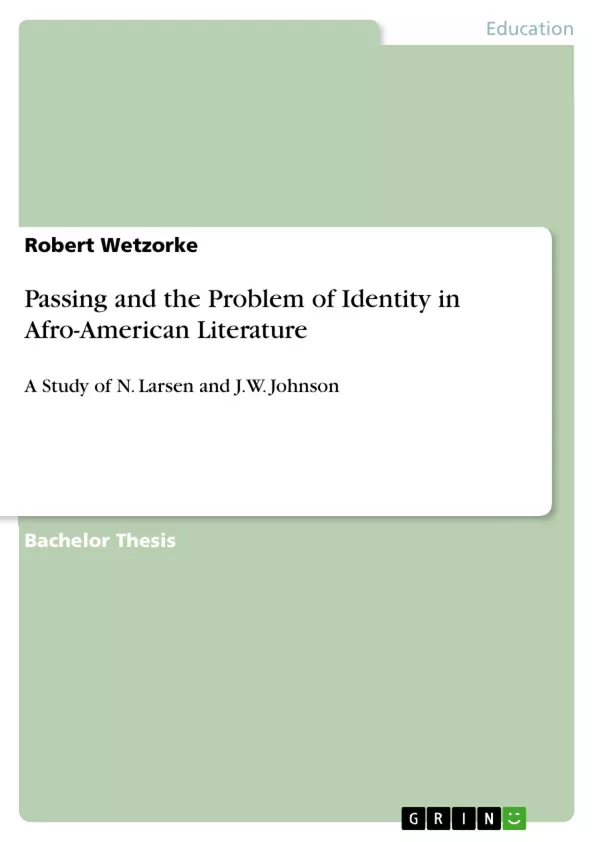Excerpt from the Introduction:
Before defining the phenomenon of passing in its social, cultural, and historical backgrounds and origins, motives and appearances in former and present times of American society, and, specifically, analysing its representation in literature, it might be fruitful to have a look at the genesis of the Afro American novel throughout the last two centuries.(...)
The main challenge of the African American author can be illustrated as a kind of ridge walk between, on the one hand, assimilation as a means of improving career prospects and social recognition, and, on the other hand, documenting the historical and socio-cultural facts of the struggles of their social group such as the ambiguities of crossing the color line in the form of the act of passing for white. This aspect of intra-racial conflict between individual success, and the moral of earnestness and showing loyalty to one’s black fellows is only one aspect to be dealt with in this thesis.(...)The loss of (cultural) individuality and physical consciousness (...)has played a central role in Afro American literature and can be seen as one of the driving forces encouraging the Harlem Renaissance movement of the 1920s and 30s in trying to establish and celebrate the cultural identity of African Americans (Göbel 2001). (...)
The aim of this paper will be, firstly, to describe the main conflicts of African American history and culture. Secondly, it will point to the impacts resulting from these struggles before. In a third step, the act of passing as a means to fight these struggles will be closely examined in its origin and multiple ways of happening, in context with cultural processes within American society as well as its representation in literature, mainly the Afro American novel. The main part will be the study of two selective novels by the two authors listed in the title of this paper, James Weldon Johnson (The Autobiography of an Ex-Coloured Man, 1912), and Nella Larsen (Passing, 1929), for several reasons. Considering the time in which their literary works gained literary reputation it can be argued that they both belong to the main advocates of the Harlem Renaissance. Moreover, the two novels under scrutiny here can be considered two of the most relevant “passing novels”, which found in the topic of passing one of their most significant theoretical inputs as well as expressive outputs in the history of this sub-genre of Afro American literature.
Inhaltsverzeichnis (Table of Contents)
- Introduction: The Establishment of the Topic of “Passing” in Afro-American Literature
- Introducing the “Color Line”: Race and Identity in Afro-American Literature
- Historical Context: The Roots of the Socio-Cultural Phenomenon of “Passing”
Zielsetzung und Themenschwerpunkte (Objectives and Key Themes)
This paper aims to explore the historical context and social significance of "passing" as a phenomenon in Afro-American literature, examining its roots in American racial history, its cultural manifestations, and its representation in select novels.
- The establishment and evolution of the "color line" in American society, particularly during the Jim Crow era.
- The impact of "passing" on African American identity and self-perception.
- The role of the Harlem Renaissance in shaping the understanding and representation of "passing" in literature.
- The socio-cultural context of "passing" as a response to racial discrimination and segregation.
- The literary representation of "passing" as a theme and its exploration in select novels by African American authors.
Zusammenfassung der Kapitel (Chapter Summaries)
The first chapter introduces the concept of "passing" in the context of Afro-American literature, outlining its historical and cultural origins. It discusses the significance of the Harlem Renaissance in promoting a more positive understanding of "passing" among African Americans and in examining the role of "passing" as a form of resistance against racial oppression.
The second chapter explores the establishment and evolution of the "color line" in American society, focusing on the role of miscegenation laws and the one-drop rule in perpetuating racial segregation. It analyzes how the "color line" impacted the lives of African Americans, including their identity formation and social experiences.
Schlüsselwörter (Keywords)
Key terms and concepts explored in this work include "passing," "color line," "race," "identity," "miscegenation," "segregation," "Jim Crow," "Harlem Renaissance," "African American literature," and "double consciousness."
- Quote paper
- M.A of Education Robert Wetzorke (Author), 2008, Passing and the Problem of Identity in Afro-American Literature, Munich, GRIN Verlag, https://www.hausarbeiten.de/document/140496


